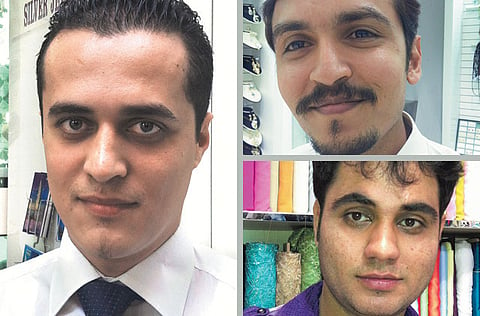Dubai polyglots learnt new languages on the job
Salesmen in the Deira area speak foreign languages to close deals

Dubai: Foreign languages are being picked up in places that don’t require you to take up formal lessons.
In the bustling streets of Deira, dovetailed with stores selling various wares from jewellery to clothes and bric-a-brac, most salesmen speak five to six languages — learnt on the job.
The more the sales experience, the more conversant they are at speaking, differentiating dialects and even spotting cultural nuances. Here amidst the retail pastiche of loud honks, whispered deals, bargain hunters and leisurely tourists, the exposure to different cultures and languages is a reality. And one of its perks is being able to pick up a few foreign languages.
After a recent trip, Gulf News spoke to salesmen who have picked up conversational Mandarin, Russian, Japanese, Arabic, Iranian, Italian, Bulgarian, Azerbaijani, French, Spanish, Albanian and Serbian, among others.
“The languages depends on the kind of tourists we have as customers,” says Priyesh Soni, an Indian who speaks Russian, Mandarin and Japanese in the four years he has worked with Barakat Jewellery in the Gold Souq area.
Soni admits that in each language he has mastered only 50 per cent. He was prompted to learn so he could cater to tourists who do not speak English.
“I can talk to them in their language and eventually make a sale. I can exchange pleasantries and answer questions relating to a jewellery piece of interest. Quite often they are surprised,” he says.
Serkan Abay, a Turk, is familiar with more languages than he realises. Working in sales at Faris Zahron Jewellery in the same Gold Souk area, has even learnt to speak Kosovar languages Albanian and Serbian.
Apart from his native Turkish, he speaks eight or more languages.
Abay says: “I am interested in learning so I pay more attention when I deal with customers.”
Moving towards the Naif area, textile merchants and their sales staff have similar stories.
Vasu Devnathani, an Indian shop clerk at the New Naif Market, can speak up to six languages including Arabic, Iranian and Russian. Since 2003, he says he has dealt with the usual tourists from Iran, Russia and China. However, for the past 18 months, he has had regular customers from Zanzibar and Kenya. He says this will have an influence on newer languages.
Like Soni, Abay and Devnathani, countless salesmen in the Deira area speak foreign languages to get by.
They aren’t linguists and may not be able to delve into etymology, semantics and pronunciation of foreign languages, but they can recognise dialects. They can glean from cultural habits. And as one salesman said, even get by in a foreign country if invited.
Moving away from the retail hub, Gulf News contacted two experts to understand the benefits of learning a foreign language in multicultural Dubai.
Mahina Bukhari Shah, Marketing Officer at Eton Institute that specialise in language training says, speaking one’s language can bridge the gap between cultures.
“You create a personal connection with people when you speak in their language — for business or social reasons. You also learn what is acceptable, what isn’t. Common cultural etiquette can get you more in tune to cultural sensitivities and traditions.”
Referring to formal learning, Reem Shehab, Director-Dubai Branches, Berlitz Language Centre, says that English continues to be the top language taught. She says, “Languages are seasonal. Two years ago we had a noticeable increase in students wanting to learn Farsi.”
However, during the past few years, there has been an increase in demand for Spanish as opposed to Italian in the past. Arabic remains the second-most learnt language, she adds.



